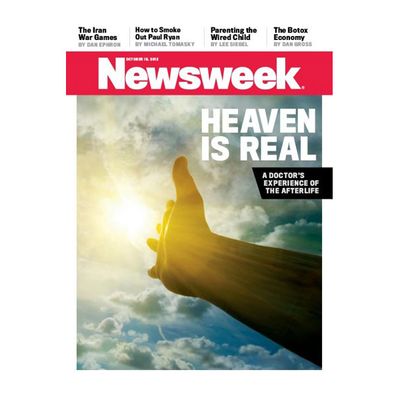
When IAC chairman Barry Diller finally admitted in public that he regretted ever buying Newsweek, that much was already obvious. The weekly magazine, as it had been known for eight decades, was already gone, ceasing its print edition at the end of 2012, two years after the struggling magazine’s savior Sidney Harman bought it for $1 (plus liabilities, from the Washington Post Company) only to pass away, and a few months after Harman’s surviving family members pulled out of the shared arrangement. The iPad-only edition that followed, and continues to “publish” every week, was never more than a placeholder.
Wednesday, the other shoe tumbled down with a thud: What’s left of Newsweek is for sale, editor-in-chief Tina Brown and Newsweek CEO Baba Shetty said in a statement, because “its demands have taken attention and focus away from The Daily Beast.” But who would want it? At what cost? And why? Here are a few ways Zombie Newsweek could live on.
As a brand …
“Newsweek as Newsweek is already gone,” said media critic Jeff Jarvis. “The allure of trying to rescue grand old Newsweek is gone.” While the company is flaunting the success of its “breakthrough digital product” and said it expects to “break even” in Q4, “There simply is no Newsweek now for all practical purposes,” he said. “What lies there is a brand with high recognition — good or bad.” And that could have value for a company, so long as they’re loosely trading in “news” as a commodity.
“Bottom line: there’s brand recognition and I don’t think it’s negative equity. Within [the media] world, sure, there’s ridicule to be had for whoever gets the hot potato, but that’s meaningless in the market.”
A media company with some existing infrastructure could make use of the name with some reengineering — Al Jazeera, for instance, the Qatari cable network that purchased Al Gore’s Current TV and is looking to make its presence known in America, poaching talent from the likes of CNN and Time. A publication, even an online-only one with a well-known domain, could lend the channel some legitimacy.
Outside of news, even consumer brands are looking toward content. “Pepsi Newsweek? I don’t know!” Jarvis wondered. “Red Bull Newsweek? Maybe.”
As a mogul’s pet project …
“It really only takes one guy,” said media-business analyst Rick Edmonds. “I think it’s somebody who’s old enough to remember the glory days and has an affection for what Newsweek has been.”
“Who? A [Mort] Zuckerman, a David Bradley, a Diller-like figure with lots of wealth and the ability to resurrect an old brand,” offered news analyst Ken Doctor. “None of those three are likely interested, but that kind of figure.” The Koch brothers, looking to expand their political influence into media, could also use a mantle in addition to the daily newspapers they have their eyes on.
“Someone could come in — the Kochs, Richard Branson — that’s always a possibility and it’s a market-breaker,” said Jarvis. “He’s going to pay more than the market will bear. And if Donald Trump buys it and makes it into Trumpweek and it’s an embarrassment, what does Diller care? He’s not the keeper of it for all time. It’s been laundered.”
“Conceivably it could be a younger person who has an assortment of ideas about how to develop a digital news product and thinks this is a good shell to launch from,” Edmonds added. But whereas Facebook co-founder Chris Hughes bought the struggling New Republic as a “cause-related magazine,” said Jarvis, Newsweek is “not imbued with a lot of brand characteristics. You buy TNR because of what it is. You buy Newsweek because of what you can do with it. It’s an empty vessel.”
As a start-up …
“Imagine you’re the founders of a mobile app,” said Jarvis, working in aggregation, for example. “Or if I were one of the long-form sites out there — any one of them, if they had a sugar daddy, would be happy to have that brand and give it new characteristics based on what it’s doing.”
“One could argue that they’ve gone and done some of the work to make the display better,” said Edmonds. “They do seem to have followed through on the magazine in a digital format. And they’ve kept at least some of their staff together. The worst, most broken-down magazine is worth something in that it has a list of people who are interested in that kind of thing.”
“The recovery has buoyed ad hopes overall,” Doctor said. “Newsweek’s emerging sponsorship–content marketing ad model is the hot model of the time. It’s growing and more top advertisers and agencies are signing on. On the negative: It’s playing against Atlantic, Daily Beast itself, and other general interest digital, mainly websites — and it’s behind all of them in that derby. Rebuilding it is a long-term process.”
So what’s it worth?
One can’t imagine very much. “If it was worth a dollar two or three years ago it’s hard to imagine it’d be worth more now,” said Edmonds. “If you take away the liability,” as Diller & Co. did by stripping it down to the tablet format, “is it worth more than a dollar?” asked Jarvis. “Yeah! Otherwise why sell it, I guess.”
Doctor was more optimistic, guessing $5 to $10 million, “or less,” based on “the brand and the more fluid market that now exists, compared to 4 years ago.”
As for attempting to make it a magazine again …
“I really have a hard time seeing a business case for relaunching it as a print publication,” said Jarvis, “unless one was very much going to reposition it and had some big ideas about building supporting businesses. That seems like a long shot.” Whoever the prospective buyer, printing pages again might be the craziest idea of all.





























